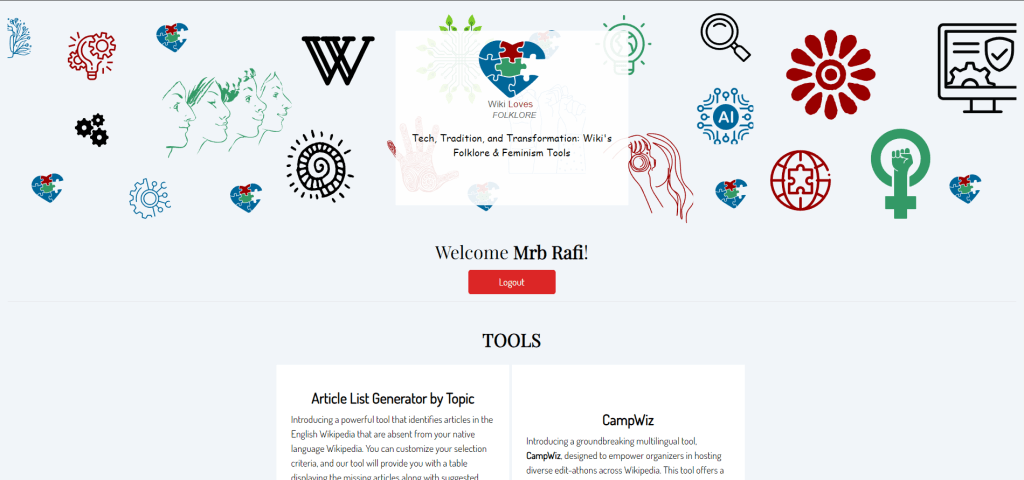Feminism and Folklore is an international writing contest organized by Wikipedia communities annually in the months of February and March to document folk cultures and women in folklore in different regions of the world on different language versions of Wikipedia.
This global campaign, from the house of Wiki Loves Folklore, faced challenges right from the start. A noticeable gap existed as the campaign organizers required advanced tools for specific tasks, and the existing Wikimedia tools weren’t suitable for their needs.
After a considerable wait, Wiki Loves Folklore joined forces with Project Korikath at Wikimania Singapore to create their own toolkit, tailored to serve their global campaign. The toolkit is now in use for the first time in the Feminism and Folklore 2024 campaign.
You’re invited to pay a visit to the toolkit: https://tools.wikilovesfolklore.org/

Photo by Mrb Rafi, CC BY-SA 4.0
“We need a tool which would help the 40 Wikimedia communities that take part in the contest. This will be of help to the organizers as well as participants and will encourage them to participate effectively in the contest”
– Tiven2240 at Wikimania Singapore
Feminism and Folklore required two straightforward tools: one to identify articles present in English Wikipedia but missing in any target language Wikipedia. This list can be utilized by national organizers worldwide. The second tool is a comprehensive editathon organizing solution. Due to unique needs, existing infrastructures in the movement were unable to fulfill the requirements of Feminism and Folklore.
Project Korikath extended the hand of friendship, and its tech wing dedicated several months to identify unique needs, code, and deploy the toolkit within Wiki Loves Folklore’s own web spaces.
“It is very easy to handle for any software ignorant people like me.”
– Nettime Sujata
As both Project Korikath and Wiki Loves Folklore comprise Wikimedia organizers, they collaborated to make the toolkit as user-friendly and intuitive as possible, drawing on their years of organizing experience. The toolkit is hosted using WLF’s own domain and server space, providing full autonomy and quick operational advantages. A dedicated team, consisting of people from both WLF and Project Korikath supports the toolkit, ensuring ongoing recruitment, future developments, and maintenance as needed. This approach aims to prevent the initiative from lacking proper attention and accumulating technical debt. The team is working to establish a workflow that addresses user concerns within the shortest time because, as organizers themselves, they understand that a few minutes of inactivity during campaign periods can jeopardize a whole Wikimedia initiative.
There is a user manual available for the toolkit on meta. You can access it from Meta-wiki.
The technical team behind this tool gathered feedback from its primary users and received an impressive average rating of 9.75 out of 10 in both User Experience and Performance criteria. Additionally, we received overwhelming feedback and valuable suggestions.
“The ability of the tool to generate both CSV and Wikitables is just amazing.”
– Alhassan Mohammed Awal
We have plans to incorporate new tools into the toolkit in the future to meet the growing needs of ‘Wiki Loves Folklore’ and ‘Feminism and Folklore.’ Additionally, we’ll enhance our technical capabilities by diving deeper into Wikimedia Tech, ensuring the proper and sustainable use of its components.

Can you help us translate this article?
In order for this article to reach as many people as possible we would like your help. Can you translate this article to get the message out?
Start translation